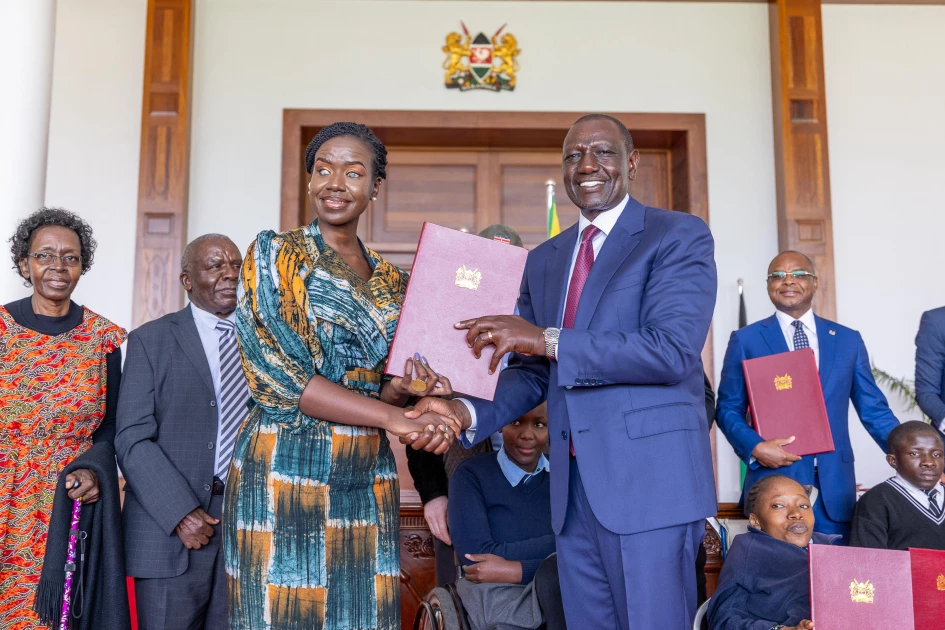Senator Asige: How Persons with Disabilities Act will improve digital access

President William Ruto with Nominated Senator Crystal Asige after he assented to the Persons with Disabilities Bill on 08/05/2025

Audio By Vocalize
This is due to existing barriers to inclusion, which prevent persons with disabilities from accessing information and services digitally. Also, there is a lack of necessary assistive technologies or the failure by developers of digital products to make them accessible for all.
The Kenya Population and Housing Census 2019 showed that 918,270 Kenyans, 2.2% of the population, have a form of disability. This population faces digital exclusion when there is a lack of access to assistive technologies to enable them to live independent lives.
Through the Persons with Disabilities Act 2025, Senator Crystal Asige sees a potential improvement in digital access as the Act lays a legal framework for compliance with enabling laws.
Even as the government makes efforts to move public services online – specifically on eCtizen, Senator Asigi notes barriers to accessibility might prevent persons with disabilities from accessing these services.
“To fix this, first we need to stop treating accessibility as an afterthought or a special feature. It must be baked in from the beginning — what we now call accessibility by design. This means making sure websites and apps are built to work with screen readers, have alt text on images, offer voice commands, and allow for keyboard-only navigation,” Asigi proposes.
The legislator cites the Act’s stipulation in Section 26, which requires ICT providers to make their platforms accessible to persons with disabilities.
Under the act, every ministry will be required to establish Disability Mainstreaming Units.
“These units are supposed to make sure that all government programs — including digital services — are accessible and inclusive. They are required to track progress and report on compliance every year,” she told Citizen Digital.
To achieve this, Senator Asigi calls for an “accessible by design” approach, where developers of digital technologies include persons with disabilities in all stages of product cycles.
“When developers build platforms like eCitizen or university portals, they shape how people access public services, education, and even justice. If those platforms don’t include accessibility features like screen reader compatibility, close captions, or keyboard navigation, they exclude millions,” she says.
The nominated Senator also advocates for specialized training for developers, to enable them familiarize themselves with accessibility standards.
“They should build with empathy, knowing that their code can open or close doors for someone else.”
The Act, signed into law by President William Ruto in May 2025, also provides a framework for protecting, promoting and monitoring the rights of persons with disabilities.
In the education sector, for instance, the Act states that all learning environments — digital and physical — must be accessible. It mandates inclusive education, adaptive technologies, individualized support, and teacher training.
This, Senator Asige says, calls on learning institutions to audit learning platforms such as student portals and school infrastructure to ensure accessibility for all.
“They need to bring in persons with disabilities at the design stage, not later, because to truly honour the right to education, we must make sure no student has to fight to access what everyone else receives without question,” she says.
Through the implementation of this act, Asige says, Kenya will also witness improvements in the cost and availability of assistive devices and technology.
This is by incentivising local production of assistive devices, putting in place tax deductions for manufacturers and subsidies for local production.
Through enabling companies to produce assistive devices locally, the competition could help reduce costs over time. These tax exemptions could also be a relief to the financial barriers hindering purchase of assistive devices to enable digital access.
With the National Council for Persons With Disabilities (NCPWD) leading the way, the legislator says various ministries will play individual roles in ensuring compliance.
For instance, the Ministry of ICT could enforce accessibility compliance for digital products used by Kenyans. “Each of these institutions must not only comply, but collaborate, with disabled persons leading the conversation — not just being consulted after decisions are made,” Senator Asige emphasizes.
She calls on public institutions to lead the way in meeting accessibility standards and including persons with disabilities at the decision-making table and throughout the product development cycle.
“Developers and designers of digital platforms like eCitizen or other public service portals are the builders of inclusion or exclusion. Their choices directly impact whether someone can access a service or not. They must embrace accessible design from the start,” she says.
The Senator also urges the general public to be champions of the Persons with disabilities Act, and see themselves as part of the solution to inclusion. This is with the support of civil society and advocacy groups that can push for the implementation of the act.


Leave a Comment